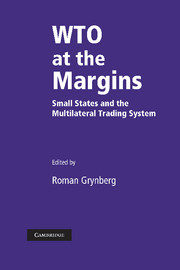Book contents
- Frontmatter
- Contents
- List of figures and appendices
- List of tables
- List of contributors
- Introduction
- Part I Theory and evidence
- Part II WTO and small economies
- Part III WTO dispute settlement
- 11 Small states in the banana dispute
- 12 Impact of changes in the European Union's policy for banana imports on the Eastern Caribbean Region (1992–2002)
- 13 Jamaica and the case in the WTO against the European Communities regime for the importation, sale and distribution of bananas (1992–2001)
- 14 WTO complaints by Australia and Brazil regarding the EU sugar regime
- 15 Reform of EU export subsidies on sugar: the legal and economic implications for the ACP countries
- 16 Analysis of the impact of opening up the EU import market for canned tuna on ACP countries
- Part IV Negotiating issues and institutional arrangements
- Index
13 - Jamaica and the case in the WTO against the European Communities regime for the importation, sale and distribution of bananas (1992–2001)
Published online by Cambridge University Press: 05 May 2010
- Frontmatter
- Contents
- List of figures and appendices
- List of tables
- List of contributors
- Introduction
- Part I Theory and evidence
- Part II WTO and small economies
- Part III WTO dispute settlement
- 11 Small states in the banana dispute
- 12 Impact of changes in the European Union's policy for banana imports on the Eastern Caribbean Region (1992–2002)
- 13 Jamaica and the case in the WTO against the European Communities regime for the importation, sale and distribution of bananas (1992–2001)
- 14 WTO complaints by Australia and Brazil regarding the EU sugar regime
- 15 Reform of EU export subsidies on sugar: the legal and economic implications for the ACP countries
- 16 Analysis of the impact of opening up the EU import market for canned tuna on ACP countries
- Part IV Negotiating issues and institutional arrangements
- Index
Summary
Background
The banana is the most widely consumed fruit in the European Union (EU). The Member States of the Union provided stable markets for bananas from the African, Caribbean and Pacific (ACP) Group of States and Latin America for many years. Bananas are an important export product for a number of small Caribbean countries which are members of the Caribbean Community (CARICOM). They are one of the three primary export crops in Jamaica, the others being sugar and coffee. Currently, the banana is Jamaica's third most important export crop.
For Jamaica, bananas have been one of the major export crops since 1869 following their introduction as part of the ongoing effort to diversify the economy out of its dependence on sugar production. Banana cultivation was dominated by small farmers as it required little investment outlay and generated a steady income, thus contributing to poverty alleviation. Owen Jefferson in his book The Post-War Development of Jamaica points out that by 1890, bananas had replaced sugar as the leading export crop and in 1930 accounted for 57 per cent of total exports from Jamaica. Jefferson also points out that banana production collapsed in the 1940s due to the ravages of Panama disease which cannot be treated. Exports were also severely restricted during the Second World War due to the lack of shipping capacity. Thereafter, bananas never regained the position as Jamaica's major export crop although production levels rose significantly during the 1950s and '60s.
- Type
- Chapter
- Information
- WTO at the MarginsSmall States and the Multilateral Trading System, pp. 484 - 521Publisher: Cambridge University PressPrint publication year: 2006



